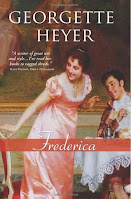 |
| (Amazon UK links) |
'Frederica' is one of my favourites of all. This novel is set, as are most of this author's works, in the upper-class society of Regency England. The heroine of the book, is the oldest of an orphaned family of five children. At twenty-four she considers herself well past marriageable age, almost on the shelf. She has never been in love, and doesn't expect to be. Instead all her ambitions are focussed on her stunningly beautiful sister Charis, who is eighteen.
Frederica decides that she has to launch Charis into London society, which should enable her to make a successful marriage. So she arranges to rent out the family home in the country and takes Charis, as well as their two younger brothers Jessamy and Felix, to a rented house in the city. There they discover that it's not as easy as they had hoped. Society was apparently very cliquey, and since they are not known, they receive no invitations.
So Frederica, nothing daunted, writes a note to Lord Alverstoke - a distant relative whom she remembers her father mentioning. Alverstoke is a wealthy man in his thirties who has become entirely bored with life, having never wanted for anything. His tiresome sister is plaguing him to hold a ball to launch her rather plain daughter Jane into society, and he has refused... until he realises that his best revenge is to hold the ball and invite Frederica and Charis as special guests. Charis, he knows, will far outshine his unfortunate neice!
Alverstoke does not expect to have anything to do with the Merrivale family after the ball, but things do not turn out quite as expected. The family's dog, used to the countryside, runs amok in a London park and chases some cows. Frederica is threatened with the dog's destruction until she claims the guardianship of her titled distant cousin. Then there's a very enjoyable subplot involving Felix, an enterprising twelve-year-old. He is fascinated by everything mechanical, and realises that his new relative can gain him entry into all kinds of places (such as an iron foundry) which would not normally be accessible to children.
While my socialist side is rather revolted as the thought of the deeply ingrained snobbery of the times, this book is written with such humour and irony that I barely notice the class consciousness while reading. Indeed, Frederica herself is slightly ashamed at what she has done after overwhelming the park-keepers with the name of Lord Alverstoke. But she realises that to save her dog's life she must take drastic measures!
Felix, moreover, is an entirely unexpected and delightful character - educated at home, he is eager to learn and has remarkable understanding of the scientific advances of the period. During the course of the book, I learned about early balloon ascensions (when they were still powered with hydrogen), and the 'pedestrian curricle', which was apparently the precursor to the bicycle. There is no irritating author's eye view, explaining things from a modern perspective in a condescending fashion; instead we see everything clearly through the eyes of the people concerned.
I've read this book at least four times, if not more. I enjoy it just as much each time, and will probably continue to read it regularly, every few years. Picking it up recently, I felt as if I were getting in touch with old friends; while reading, I felt almost as if I were re-visiting favourite places from the past. Of course I hadn't forgotten the main plot-lines, but there were still several places that made me smile, and one or two moments that brought a tear to my eye.
Highly recommended.
No comments:
Post a Comment